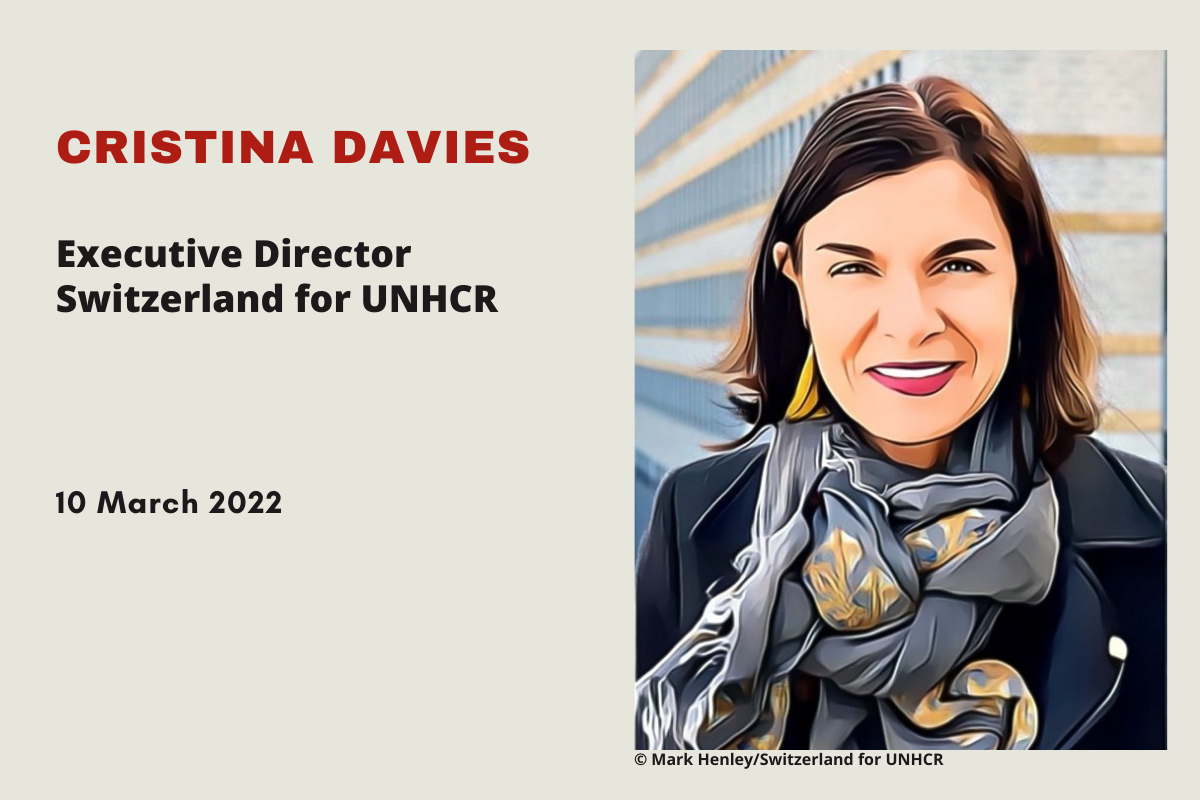The Interview | Cristina Davies
 |
Could you tell us briefly what your organization does? What is your role? What is your goal? |
Switzerland for UNHCR Foundation is the national partner of the United Nations Refugee Agency for Switzerland. It was created in 2020 to support UNHCR's mission by mobilizing essential resources for its programs and raising public awareness of the plight of those forced to flee their homes.
At a time when walls are going up and the refugee question is increasingly being instrumentalized by politicians and the media, it is important to have a positive impact on public perceptions of refugees in Switzerland. So far, 84 million women, men, and children, each with their own story, have been forced to flee their homes, leaving everything behind.
My transition from UNHCR headquarters to the Foundation reflects our objective for Switzerland, which is to anchor the UNHCR locally and enhance our proximity with the private sector and civil society more broadly.
 |
Among the concentration of actors in Geneva (OIs, NGOs, permanent missions, academia, and the private sector), who do you work with and how? |
As a Swiss foundation registered in Geneva, our primary focus is on the private sector and the public. We also maintain relationships with academia and civil society, as always with the aim of advocating for refugees and mobilizing resources to support them.
 |
What are the strengths and weaknesses of Geneva with regards to the development of your activity? |
The UNHCR's headquarter is in Geneva, and the Convention Relating to the Status of Refugees was adopted here. When we decided to create the Foundation, I thought of Bern at first because of its central location in Switzerland. But upon reflection, the key role that Geneva plays in the humanitarian sector, and the fact that our global headquarters are in Geneva, naturally led us to reconsider. To be perfectly honest, if the UNHCR had not been here, I am not sure we would have based the Foundation in Geneva.
That said, when we contacted the Cantonal Office for International Geneva, we immediately felt listened to and supported. And Geneva offers a community and support system in our specific area that we would probably not have found elsewhere in Switzerland.
However, what is true of Geneva, is not necessarily true of the rest of the country. That reality is something we need to remind ourselves of daily. Geographically, Geneva is located on the periphery and it is, therefore, important to ensure that our messages and our initiatives also reach the 77% of Swiss residents who don't speak French, for instance.
 |
What do you think global governance should look like 20 or 30 years from now? |
Unfortunately, I don't have a crystal ball. More seriously, that is a crucial question given how high the stakes are, and one that is very difficult to answer in a few lines. I have a profound belief in the intrinsic values embodied by the multilateral system, but it is difficult to predict what direction the world will take in 20 years, let alone 30.
The uncertainty we are experiencing today worries me. Over the past 20 years, we have witnessed the erosion of the multilateral system and a shift towards an unstable and increasingly inward-looking multipolar world.
 |
What question would you like to have been asked? |
I would have liked to be asked: What impact has the conflict in Ukraine had on your work in recent weeks?
A huge impact. Since the first day of the conflict in Ukraine, all our teams have been working hard to raise key funds for our operations on the ground and provide media coverage of the situation and UNHCR's messages.
It is a job that reflects the enormity of the conflict. In 12 days, more than 2 million people have already fled the fighting and taken refuge in neighboring countries. And these numbers continue to rise. If the situation continues to deteriorate, up to 12 million people inside Ukraine and 4 million refugees from Ukraine will need assistance and protection. We are simply witnessing the largest displacement of people in Europe since World War II, and at a fulgurant pace.
To address this situation, UNHCR has intensified its response within Ukraine to support neighboring countries and beyond, to respond to the arrival of large numbers of refugees, the vast majority of whom are children and women.
I wish to underline the enormous support given by the Swiss population and the Swiss private sector. This incredible solidarity movement, which stems from a long tradition of support for refugees, further strengthens Switzerland's image as a country committed to humanitarian causes.
